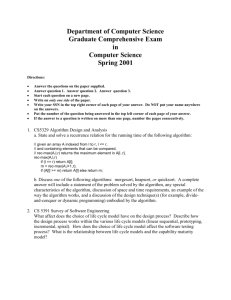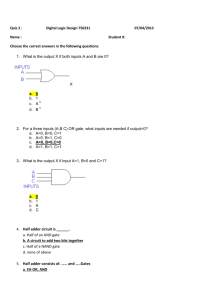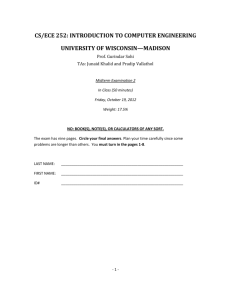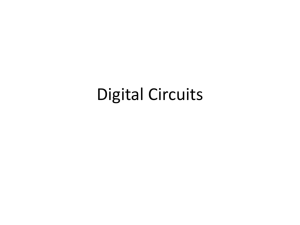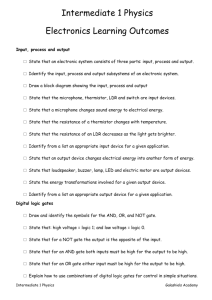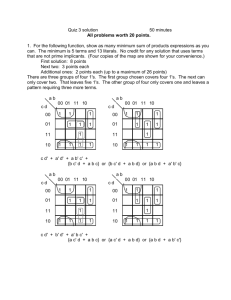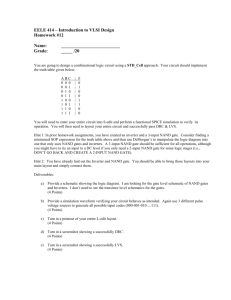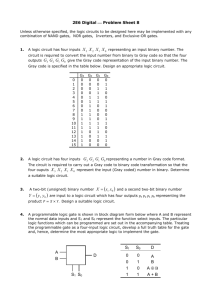Logic gates
advertisement
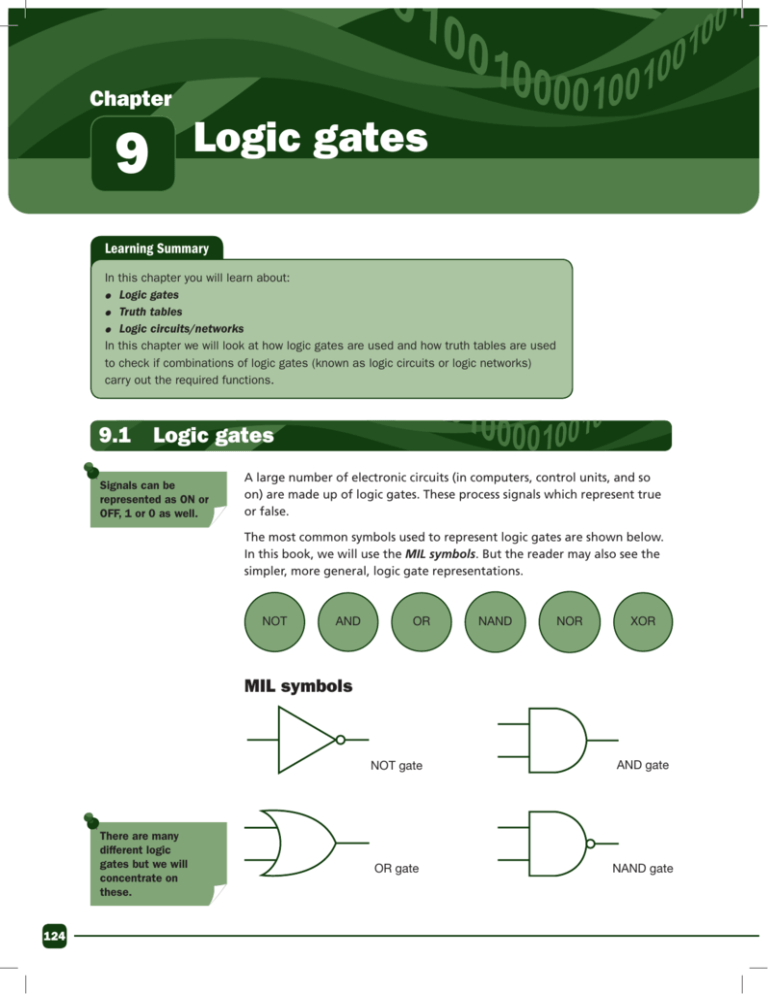
Chapter Logic gates 9 Learning Summary In this chapter you will learn about: ● Logic gates ● Truth tables ● Logic circuits/networks In this chapter we will look at how logic gates are used and how truth tables are used to check if combinations of logic gates (known as logic circuits or logic networks) carry out the required functions. 9.1 Logic gates Signals can be represented as ON or OFF, 1 or 0 as well. A large number of electronic circuits (in computers, control units, and so on) are made up of logic gates. These process signals which represent true or false. The most common symbols used to represent logic gates are shown below. In this book, we will use the MIL symbols. But the reader may also see the simpler, more general, logic gate representations. NOT AND OR NAND NOR XOR MIL symbols There are many different logic gates but we will concentrate on these. 124 NOT gate AND gate OR gate NAND gate Logic gates NOR gate 9.2 9 XOR gate Truth tables Truth tables are used to show logic gate functions. The NOT gate has only one input, but all the others have two inputs. When constructing a truth table, the binary values 1 and 0 are used. Every possible combination, depending on number of inputs, is produced. Basically, the number of possible combinations of 1s and 0s is 2n where n = number of inputs. For example, 2 inputs have 22 combinations (i.e. 4), 3 inputs have 23 combinations (i.e. 8) and so on. The next section shows how these truth tables are used. Description of the six logic gates NOT gate A NOT X A The output (X) is true (i.e. 1 or ON) if: X INPUT A OUTPUT X INPUT A is NOT TRUE (i.e. 0 or OFF) 0 1 Truth table for: X = NOT A 1 0 AND gate A A AND X X B B The output (X) is true (i.e. 1 or ON) if: INPUT A INPUT B OUTPUT X INPUT A AND INPUT B are BOTH TRUE (i.e. 1 or ON) 0 0 0 0 1 0 Truth table for: X = A AND B 1 0 0 1 1 1 125 IGCSE Computer Studies Revision Guide OR gate A A OR X X B B INPUT A INPUT B OUTPUT X 0 0 0 The output (X) is true (i.e. 1 or ON) if: 0 1 1 INPUT A OR INPUT B is TRUE (i.e. 1 or ON) 1 0 1 Truth table for: X = A OR B 1 1 1 NAND gate A A NAND X X B B INPUT A INPUT B OUTPUT X 0 0 1 0 1 1 1 0 1 1 1 0 INPUT A INPUT B OUTPUT X The output (X) is true (i.e. 1 or ON) if: 0 0 1 INPUT A OR INPUT B are NOT BOTH TRUE (i.e. 1 or ON) 0 1 0 1 0 0 1 1 0 The output (X) is true (i.e. 1 or ON) if: INPUT A AND INPUT B are NOT BOTH TRUE (i.e. 1 or ON) Truth table for: X = NOT A AND B NOR gate A A NOR X X B B Truth table for: X = NOT A OR B XOR gate A A XOR B 126 X X B Logic gates The output (X) is true (i.e. 1 or ON) if: INPUT A INPUT B OUTPUT X INPUT A OR (NOT INPUT B) OR (NOT INPUT A) OR INPUT B 0 0 0 is TRUE (i.e. 1 or ON) 0 1 1 1 0 1 1 1 0 Truth table for: X = A OR (NOT B) OR (NOT A) OR B 9.3 9 Logic circuits/networks Logic gates can be combined together to produce more complex logic circuits (networks). Key Point The output from a logic circuit (network) is checked by producing a truth table. Two different types of problem are considered here: – drawing the truth table from a given logic circuit (network) – designing a logic circuit (network) from a given problem and testing it by also drawing a truth table. Example 1 Produce a truth table from the following logic circuit (network). P A NOR B OR X To show how this works, we will split the logic circuit into two parts (shown by the dotted line). AND C Q First part There are 3 inputs; thus we must have 23 (i.e. 8) possible combinations of 1s and 0s. To find the values (outputs) at points P and Q, it is necessary to consider the truth tables for the NOR gate (output P) and the AND gate (output Q) i.e. P = A NOR B Q = B AND C 127 IGCSE Computer Studies Revision Guide We thus get: INPUT A INPUT B INPUT C OUTPUT P OUTPUT Q 0 0 0 1 0 0 0 1 1 0 0 1 0 0 0 0 1 1 0 1 1 0 0 0 0 1 0 1 0 0 1 1 0 0 0 1 1 1 0 1 Second part There are 8 values from P and Q which form the inputs to the last OR gate. Hence we get X = P OR Q which gives the following truth table: INPUT P INPUT Q OUTPUT X 1 0 1 1 0 1 0 0 0 0 1 1 0 0 0 0 0 0 0 0 0 0 1 1 Which now gives us the final truth table for the logic circuit given at the start of the example: 128 INPUT A INPUT B INPUT C OUTPUT X 0 0 0 1 0 0 1 1 0 1 0 0 0 1 1 1 1 0 0 0 1 0 1 0 1 1 0 0 1 1 1 1 Logic gates 9 Example 2 Consider the following problem. A system used 3 switches A, B and C; a combination of switches determines whether an alarm, X, sounds: If switch A or switch B are in the ON position and if switch C is in the OFF position then a signal to sound an alarm, X is produced. It is possible to convert this problem into a logic statement. Remembering that ON = 1 and OFF = 0; also remember that we write 0 as NOT 1. So we get: If (A = 1 OR B = 1) AND The first part is two inputs (A and B) joined by an OR gate (C = NOT 1) The output from the first part and the third part are joined by an AND gate then X = 1 The third part is one input (C) which is put through a NOT gate So we get the following logic circuit (network): A OR B AND X C This gives the following truth table: INPUT A INPUT B INPUT C OUTPUT X 0 0 0 0 0 0 1 0 0 1 0 1 0 1 1 0 1 0 0 1 1 0 1 0 1 1 0 1 1 1 1 0 129 IGCSE Computer Studies Revision Guide Example 3 A manufacturing process is controlled by a built in logic circuit which is made up of AND, OR and NOT gates only. The process receives a STOP signal (i.e. X = 1) depending on certain conditions, shown in the following table: INPUTS V T S BINARY VALUES CONDITION IN PROCESS 1 Volume > 1000 litres 0 Volume <= 1000 litres 1 Temperature > 750ºC 0 Temperature <= 750ºC 1 Speed > 15 metres/second (m/s) 0 Speed <= 15 metres/ second (m/s) A stop signal (X = 1) occurs when: either Volume, V > 1000 litres and Speed, S <= 15 m/s or Temperature, T <= 750ºC and Speed, S > 15 m/s Draw the logic circuit and truth table to show all the possible situations when the stop signal could be received. First of all, it is necessary to turn the problem into a series of logic statements: • statement 1 can now be re-written as: V = 1 AND S = NOT 1 since V > 1000 (binary value = 1) and S <= 15 (binary value = 0) • statement 2 can now be re-written as: T = NOT 1 AND S = 1 since T <= 750ºC (binary value = 0) and S > 15 (binary value = 1) • both statements are joined together by an OR gate So, our logic statement becomes: X = 1 if (V = 1 AND S = NOT 1) OR (T = NOT 1 AND S = 1) We can now draw the logic circuit (network) by constructing it for statement 1 and for statement 2 and joining them with an OR gate. In the following logic circuit note that V has been placed at the bottom of logic diagram – this is done to avoid crossing over of lines which makes it look neater and less complex. It is not essential to do this and is only done for the reasons given. 130 Logic gates T 9 NOT Statement 2 AND S NOT OR X Statement 1 AND V We can now construct the truth table: INPUT V INPUT T INPUT S OUTPUT X 0 0 0 0 0 0 1 1 0 1 0 0 0 1 1 0 1 0 0 1 1 0 1 1 1 1 0 1 1 1 1 0 9.4 End of chapter questions In questions 1 to 6 produce truth tables from the given logic circuits (networks). Remember, if there are two inputs then there will be 4 possible outputs; if there are three inputs then there will be 8 possible outputs. The truth tables will look like this: Input A Input B 0 0 0 1 1 0 1 1 Output X 131 IGCSE Computer Studies Revision Guide Input A Input B Input C 0 0 0 0 0 1 0 1 0 0 1 1 1 0 0 1 0 1 1 1 0 1 1 1 9.4.1 Output X A OR NOT OR B X AND 9.4.2 A NOT OR NOT OR B 132 AND X Logic gates 9.4.3 A NOR B NAND AND X NOT C 9.4.4 9 A OR B OR 9.4.5 AND AND C A X XOR B OR C 9.4.6 A B XOR AND X NOT AND NOR X OR C NAND 133 IGCSE Computer Studies Revision Guide Questions 7 to 10 require both the logic circuit (network) and the truth table to be drawn. The truth table can be derived from the logic circuit (network), but can also be derived from the original problem. This could therefore be used as a cross-check that the logic circuit (network) is a correct representation of the original problem. 9.4.7 An electronic system will only operate if three switches P, S and T are correctly set. An output signal (X = 1) will occur if R and S are both in the ON position or if R is in the OFF position and S and T are both in the ON position. Design a logic circuit (network) to represent the above situation and also draw the truth table. 9.4.8 A traffic light system uses logic gates as part of the control system. The system is operated when the output D has the value 1. This happens when: either (a) signal A is red or (b) signal A is green and signals B and C are both red (NOTE: You may assume for this problem that red = 0 and green = 1). Design a logic circuit (network) and draw the truth table for the above system. 9.4.9 A chemical process gives out a warning signal (W = 1) when the process operates incorrectly. A logic circuit (network) is used to monitor the process and to determine whether W = 1. Inputs C T X Binary values Description of plant status 1 Chemical rate = 20 litres/second 0 Chemical rate < 20 litres/second 1 Temperature = 91ºC 0 Temperature > 91ºC 1 Concentration > 5M 0 Concentration = 5M A warning signal (W = 1) will be generated if: either (a) Chemical rate < 20 litres/second or (b) Temperature > 91ºC and Concentration > 5M or (c) Chemical rate = 20 litres/second and Temperature > 91C Draw a logic circuit (network) and truth table to show all the possible situations when the warning signal could be received. 9.4.10 A nuclear power station has a safety system based on three inputs to a logic circuit (network). A warning signal (S = 1) is produced when certain conditions in the nuclear power station occur based on these three inputs. 134 Logic gates Inputs T P W Binary values 9 Description of plant status 1 Temperature > 115ºC 0 Temperature <= 115ºC 1 Reactor pressure > 15 bar 0 Reactor pressure <= 15 bar 1 Cooling water > 120 litres/hour 0 Cooling water <= 120 litres/ hour A warning signal (S = 1) will be produced when any of the following occurs: either (a) Temperature > 115ºC and Cooling water <= 120 litres/ hour or (b) Temperature <= 115ºC and Reactor pressure > 15 bar or Cooling water <= 120 litres/hour Draw a logic circuit (network) and truth table to show all the possible situations when the warning signal (S) could be received. 135
